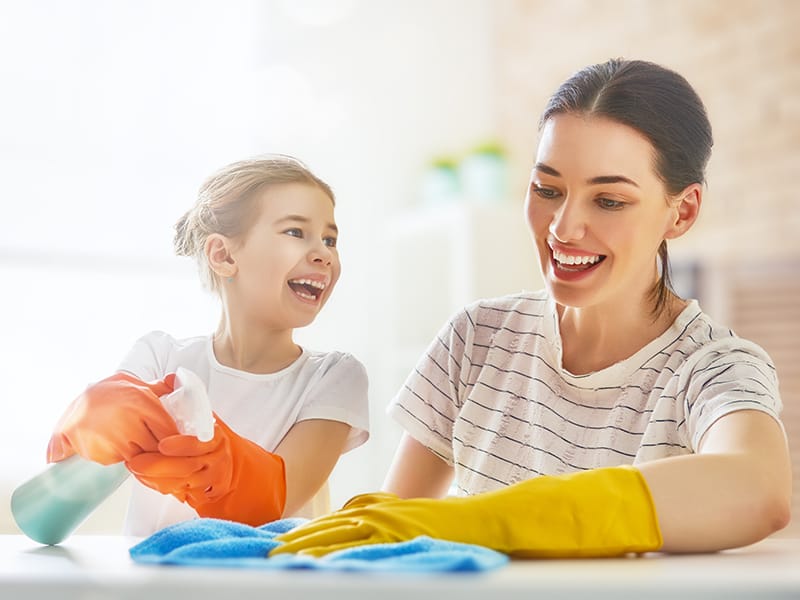Table of Contents
With spring quickly approaching, it’s time to start thinking about spring cleaning. Now that your children are old enough, why not include them and lighten your load? Introducing your children to maintaining a clean home at a young age not only reduces your workload but it also helps foster a sense of discipline, responsibility, and respect for their belongings.
By normalising household chores and following spring cleaning history and traditions, you also instil habits to help them become successful, independent adults with a healthy work ethic.
You may think that including your children in the deep clean will lead to endless frustration and frayed nerves, with younger infants getting underfoot being more of a hindrance than the mini helpers they can be. However, with a little planning coupled with the following cleaning tips for kids, you and your children will have your home spick and span in no time. You may even have fun while doing so!
So without further ado, let’s find out how to turn your little mess monsters into cleaning superstars.
Step 1: Involve Small Tasks
Start by breaking up the tasks into different categories based on the following:
- Time – How much time is needed to complete the job.
- Complexity – Does the task require the use of equipment (i.e. mop), cleaning products, and does anything need to be moved or unplugged to complete the task.
- Suitability / Safety – Can the task be completed by your child alone? Even if it can be conducted safely, is it appropriate? For example, it may be safe for your young one to clean the toilet, but is it suitable?
Once you have broken down the tasks, create a chart assigning jobs to everyone involved, this allows everyone to see which jobs need completing, who is expected to complete them, and whether or not they are expected to complete them alone.
Step 2: Set Your Cleaning Mood
The truth is domestic cleaning can be a boring task for even the most driven adults, so it goes without saying that motivating young children can be a challenge. You can overcome this by making a cleaning playlist with your children made from all your favourite high-energy tracks to dance around to while sweeping, mopping, etc.
You can also incorporate special “cleaning day costumes”, which are only worn while chores are being completed and only by those participating.
As your children get older and accustomed to their chores, you can keep them engaged by steadily increasing the tasks. This helps to ingrain a feeling of greater responsibility and shows that you trust your children to complete chores previously restricted to older children or adults.
Step 3: Turn Chores Into Play
Gamification, gamification, gamification!
Another great way to keep small children engaged is to turn chores into play, where appropriate. Here are a few ideas to get you started.
- No one likes doing laundry – So to keep it interesting, why not play laundry robots? Everyone should speak and move like robots while preparing the laundry, loading the machine, and hanging clean laundry to dry.
- Room–to–room singalong – While creating your cleaning playlist, choose some songs everyone knows the words to. When the songs come on, everyone can have a sing-along. It is even better if you are in other rooms as you can take turns singing the parts loudly to each other.
- Toy pickup race – See who can pick up and put away the most toys in the shortest amount of time.
Step 4: Set a Reward System
Setting rewards for completing chores is a widely debated topic. Those in favour of it argue that it helps motivate children to complete their chores. In contrast, those against it argue that as members of the household that contribute to the mess, children should be expected to complete their chores regardless of whether or not there is a reward.
If you are going to set up a reward system, it can be done in a number of ways, for example:
- A cash reward – Many parents tie their children’s allowance to completing chores as it builds the expectation of being paid for the work they have done. You may also offer additional rewards if your children complete more chores than assigned.
- Family trips – This is a great way to encourage children to complete their chores. For example, you could set a target of completing all daily chores, and if all targets are reached, the family gets to go to the cinema or to go out for dinner. This is also a great opportunity to include a family hobby, such as playing board games or cooking together.
Step 5: Ensure Safe Use of Chemicals and Cleaning Products
This is the biggest deterrent for parents when it comes to including their children in cleaning the home, but with some thought and vigilance, the risk of your children coming into contact with harmful substances is greatly reduced.
- Firstly, do not allow your children access to cleaning products, especially unsupervised access.
- For tasks that require the use of cleaning products, you can take charge of spraying surfaces with the product and let your child use a cloth to wipe the surface while wearing rubber gloves. There are bonus hilarity points if the gloves are comically oversized.
- Give your child a spray bottle filled with water and let them spray the surfaces, follow them with the actual cleaning product and a cloth.
- Consider switching to cleaning products that do not contain harsh, harmful chemicals. Yes, they do exist. Not only is this option environmentally friendly, but it also allows your child to use the product while supervised, of course.
Final Thoughts
Including your children in the household cleaning duties not only can reduce the time it takes to clean your home but is also very beneficial for developing your young ones.
Teaching your children to respect their surroundings as the house is not cleaned by magic, equipping them with the skills needed to be independent adults, and instilling a sense of self-discipline can’t be a bad thing, right?





